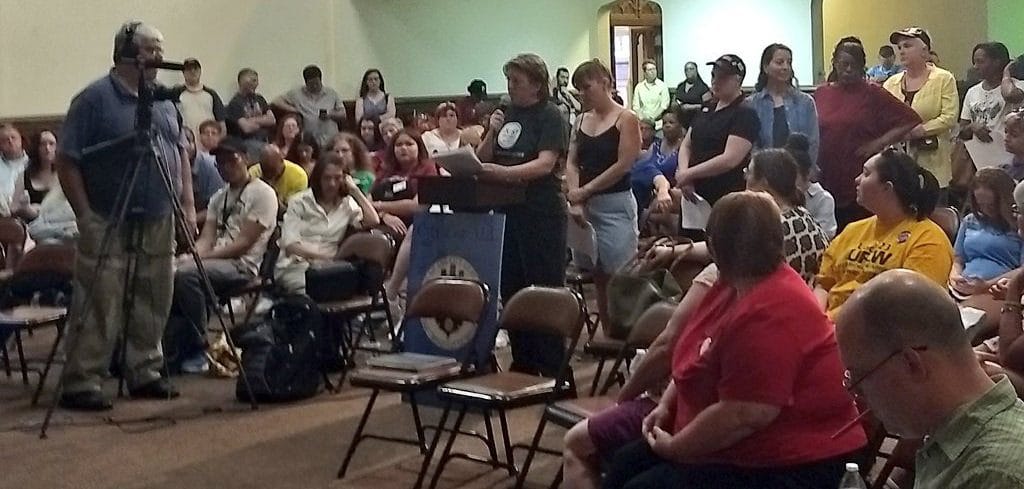
Helen Gerhardt speaks at Pittsburgh’s Wage Review Committee Community Hearing on the Retail Grocery Industry, May 24
Some 5,000 United Food and Commercial Workers (UFCW) members working for the Giant Eagle corporation are in a critical contract struggle for $15 and a Union. Good jobs that supported families until the 1980’s have become poverty jobs for a workforce that is 65% part-time. This market dominant corporation is leading the grocery industry in the wrong direction.
Starting wages of $8.25 and a long path to good wages means that 46% of Giant Eagle workers earn poverty wages and taxpayers subsidize this corporation that made $9.3 billion in revenue last year. And the corporation’s union busting practices keep the workers from having a voice on the job in 1/3 of the corporate stores.
Below is the testimony of Just Harvest grassroots organizer Helen Gerhardt at Pittsburgh’s Wage Review Committee Community Hearing on the Retail Grocery Industry, May 24. Pittsburgh City Councilman Rev. Ricky Burgess chairs the committee, which last met in 2015 to investigate local healthcare workers’ low wages and poor working conditions.
The Pittsburgh Wage Review Committee’s investigation of the impact healthcare industry wages had on Pittsburgh led to dramatic improvements in the healthcare industry for workers, for the city of Pittsburgh, and for the economy in general. Pittsburgh UNITED (of which Just Harvest is a member) is hopeful that providing the same opportunity for workers in the retail food industry to tell their stories and experiences will lead to a fuller understanding of their conditions, as well as specific public policy recommendations that will improve life for Pittsburghers.
Since 1987, Just Harvest has strengthened the public response to hunger and poverty in Allegheny County through a focus on government policy, community food access, and safety net programs. Four years ago, I started at Just Harvest as a Food Stamp specialist, helping people navigate the often complicated application process to sign up for SNAP benefits.
The large majority who called us were people who had never expected to need food assistance – people who had considered themselves to be “middle class,” who had been sick or injured, or who had a family member who suddenly needed to be cared for, or who had been laid off along with a bunch of their coworkers and were looking for their next job. Most people only needed the safety net for a few months until their life bounced back to normal.
“I go three or four days a week without eating. The only way I eat some days is when my coworkers buy my meals. I know that Giant Eagle can pay me enough to buy food. I know they can do better. I know because they have done better in the past.” #FightFor15 #Union pic.twitter.com/V2aUQ1mNJ7
— Just Harvest (@JustHarvest) May 24, 2018
But the hardest calls came from people who worked full-time at low wages, people who often took second jobs, who were working hard, day in and day out – and often far into the night – who had worked hard over the long haul but could not afford to feed their families. All too often I had to persuade such people to stay on the phone line and complete their applications – they would express deep shame at having to accept “handouts” from the government.
“These are not handouts,” I would tell them. “You have earned these benefits. You have paid taxes. These are your own dollars coming back to you for your most basic needs. For your children’s most basic health and well-being.”
So often, politicians and the media dump blame and shame on the millions of people who have to reclaim a portion of their own earnings through safety net programs in order to eat, in order to keep moving, in order to keep working hard for the fat-cat companies that pay them a pittance and keep them in poverty, the companies that claim many millions in corporate welfare year after year to pay CEOs often millions of dollars no matter how their company performs.
Many of those corporations were national giants like Wal Mart or Verizon or CVS. But there was a special sting when I spoke with men and women who worked for grocery stores that would not pay enough for them to buy the food that they sold to others. The food that those workers had earned.
To the CEO of Giant Eagle: “Laura, would you like to trade places with us? We make your money for you. We make your wealth. What would you do if we walked out? If we stopped cutting your meat? Bagging your groceries?” #UNION #FightFor15 pic.twitter.com/czjSusl3il
— Just Harvest (@JustHarvest) May 25, 2018
When these men and women apply for food stamps to keep themselves and their children from going hungry, yes, it is those grocery stores that are receiving the government handouts. It is those grocery stores feeding their own greed for profit at their workers expense on the taxpayer’s dime. On the taxpayers billions of dollars.
We at Just Harvest call on our elected officials to hold the retail grocery industry to account. We call on participants in the grocery industry to act as responsible corporate community members of Pittsburgh, our state, and our nation.
Keeping working people in long-term poverty is theft. It is theft from those men and women. It is theft from the larger community. And local grocery stores such as Giant Eagle should learn from their own responsible behavior in the past, when they paid living wages that allowed their workers to build a good life in the City that both its CEOs and its employees have long called home.




No comments yet.